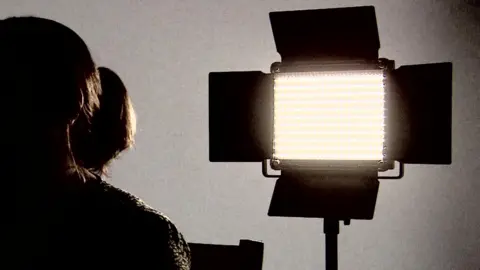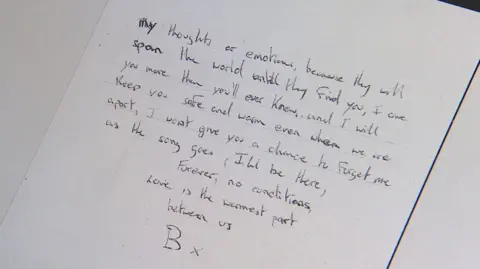'Three things that persuaded me to report my rape'
 BBC
BBCLauren - not her real name - knows how much it takes. She knows how loud the voice was inside her own head telling her not to go to the police.
"I was really reluctant to come forward myself... but I would say, it really helps to set you free," she said.
"I thought that I was going to lose my family, I thought I might... lose my friends. I even, stupidly, thought I might lose my job... because I hadn't safeguarded others properly, but now I see that's not the case at all."
"You will be believed and supported," she added.
In October, badminton coach Brian Furneaux from Ipplepen near Newton Abbot was sentenced to 13 years for two charges of rape and nine charges of sexual assault.
His victim Lauren was 15 at the time. Her decision to go to the police was made more than 20 years after the abuse she endured.
"It's been the nasty secret that I've carried around for a long time, that I've felt a lot of guilt and shame about.
"Coming through it, and knowing that I've still got the support and love of my family and friends, it's really liberating and it makes you feel justified," she said.
Decision to report
Lauren said she had "buried it all in the back of [her] mind" and got on with her life, but then several events occurred that caused her trauma to come "rushing back".
A Facebook post alerted her to the fact Furneaux was still coaching children, she saw him with a girl in his car and she had a significant conversation with a friend.
"I learned that he was still coaching and... I wanted to protect the others. It hadn't occurred to me really that he might still be coaching and that I might not be the only one," she said.
Describing an incident in a carpark she said: "I saw Brian with a young girl in the passenger seat... and when he saw me looking... he quickly sped off and there was no-one in the passenger seat.
"When I was with him he used to make me crouch down in the footwell and I think that's what he made her do."
Then there was a conversation with a friend during a walk, which had unexpectedly taken Lauren back to one of the locations where she had been abused.
"We were walking round there and she was like 'are you OK?' and I just blurted it all out."
The friend told her she thought she should report what happened to the police.

"It was what we now call grooming," she said. "He would give me a bit of extra attention and give me things. He gave me branded clothing for coaching.
"Grooming is so subtle and parents need to be alert to it, because he did a really good job on my parents; they thought he was wonderful and everyone I spoke to thought he was wonderful.
"I thought 'I'm never going to be believed, I can't possibly come out with this because no one will believe that he is capable of that'.
"I had a good supportive home life. There was nothing particular to single me out. I think everyone should be aware that it could happen in your household, it could happen with your children."
Other victims
Lauren said the reason she was speaking to the BBC was she believed there were others victims.
Det Con Tamsyn Dingley, who investigated the case, said the conviction showed that non-recent sexual offences without forensic evidence could be successfully prosecuted.
"[People] might think they don't have evidence, they might think they won't be believed, but you won't know until you come and talk to us," she said.
"Come forward if you're one of [Brian Furneaux's] victims, or you've got your own case... come forward and let us do our job the best that we can."
